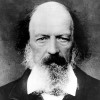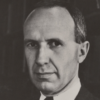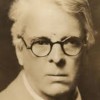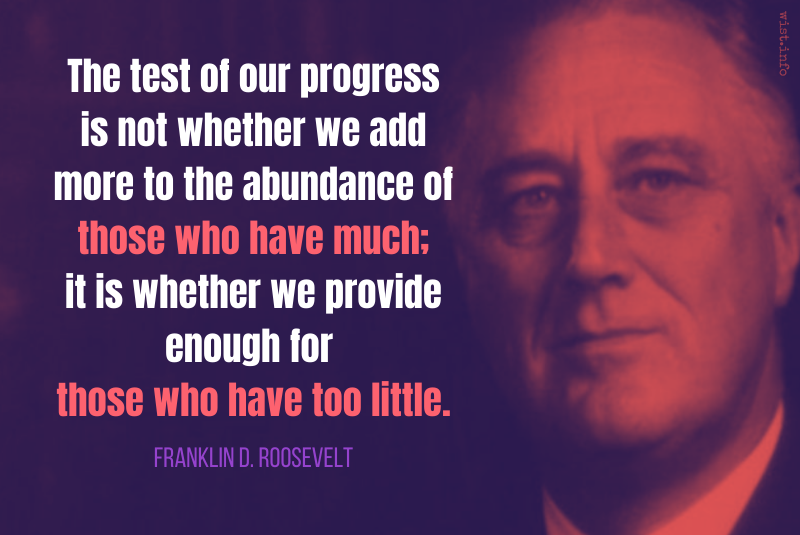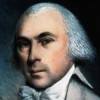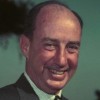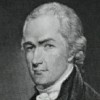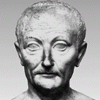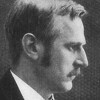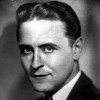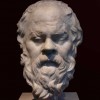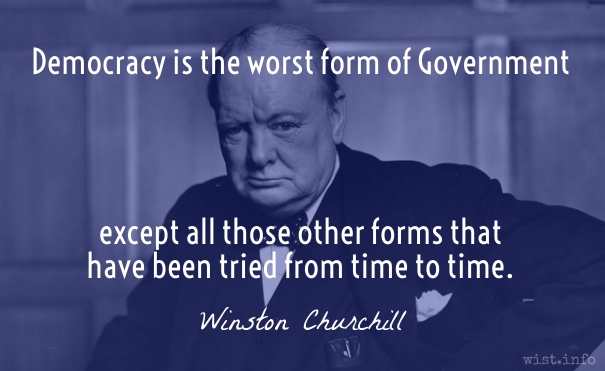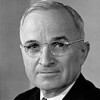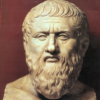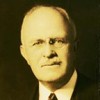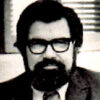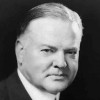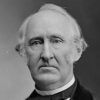We should be careful to get out of an experience only the wisdom that is in it — and stop there; lest we be like the cat that sits down on a hot stove-lid. She will never sit down on a hot stove-lid again — and that is well; but also she will never sit down on a cold one anymore.
Tho’ much is taken, much abides; and tho’
We are not now that strength which in old days
Moved earth and heaven; that which we are, we are;
One equal temper of heroic hearts,
Made weak by time and fate, but strong in will
To strive, to seek, to find, and not to yield.
It is natural to most men to suppose that they have enemies and to find a certain fulfillment of their nature when they embark upon a contest. What a man believes upon grossly insufficient evidence is an index to his desires — desires of which he himself is often unconscious. If a man is offered a fact which goes against his instincts, he will scrutinize it closely, and unless the evidence is overwhelming, he will refuse to believe it. If, on the other hand, he is offered something which affords a reason for acting in accordance with his instincts, he will accept it even on the slenderest evidence. The origin of myths is explained in this way, and much of what is currently believed in international affairs is no better than myth.
Bertrand Russell (1872-1970) English mathematician and philosopher
Roads to Freedom ch. 6 (1918)
No long-term marriage is made easily, and there have been times when I’ve been so angry or so hurt that I thought my love would never recover. And then, in the midst of near despair, something has happened beneath the surface. A bright little flashing fish of hope has flicked silver fins and the water is bright and suddenly I am returned to a state of love again — till next time. I’ve learned that there will always be a next time, and that I will submerge in darkness and misery, but that I won’t stay submerged. And each time something has been learned under the waters; something has been gained; and a new kind of love has grown. The best I can ask for is that this love, which has been built on countless failures, will continue to grow. I can say no more than that this is mystery, and gift, and that somehow or other, through grace, our failures can be redeemed and blessed.
If we commit ourselves to one person for life this is not, as many people think, a rejection of freedom; rather, it demands the courage to move into all the risks of freedom, and the risk of love which is permanent; into that love which is not possession but participation.
As the skipping rope hit the pavement, so did the ball. As the rope curved over the head of the jumping child, the child with the ball caught the ball. Down came the ropes. Down came the balls. Over and over again. Up. Down. All in rhythm. All identical. Like the houses. Like the paths. Like the flowers.
Later, he wondered if he could have changed things, if that gesture would have done any good, if it could have averted any of the harm that was to come. He told himself it wouldn’t. He knew it wouldn’t. But still, afterward, he wished that, just for a moment on that slow flight home, he had touched Wednesday’s hand.
Neil Gaiman (b. 1960) British author, screenwriter, fabulist
American Gods, Part 2, ch. 10 (2001)
(Source)
The Gettysburg speech is at once the shortest and the most famous oration in American history. Put beside it, all the whoopings of the Websters, Sumners and Everetts seem gaudy and silly. It is eloquence brought to a pellucid and almost gem-like perfection — the highest emotion reduced to a few poetical phrases.
The true rule, in determining to embrace, or reject any thing, is not whether it have any evil in it; but whether it have more of evil, than of good. There are few things wholly evil, or wholly good. Almost every thing, especially of governmental policy, is an inseparable compound of the two; so that our best judgment of the preponderance between them is continually demanded.
Abraham Lincoln (1809-1865) American lawyer, politician, US President (1861-65)
Remarks, House of Representatives (1848-06-20)
(Source)
Speaking on internal improvements (infrastructure) as part of governmental policy.
Although is had its share of strenuous Christians … the gathering at Philadelphia was largely made up of men in whom the old fires were under control or had even flickered out. Most were nominally members of one of the traditional churches in their part of the country.. and most were men who could take their religion or leave it alone. Although no one in this sober gathering would have dreamed of invoking the Goddess of Reason, neither would anyone have dared to proclaim his opinions had the support of the God of Abraham and Paul. The Convention of 1787 was highly rationalist and even secular in spirit.
Razors pain you;
Rivers are damp;
Acids stain you;
And drugs cause cramp.
Guns aren’t lawful;
Nooses give;
Gas smells awful;
You might as well live.Dorothy Parker (1893-1967) American writer
“Résumé,” New York World (16 Aug 1925)
(Source)
Reprinted in Enough Rope (1926). Parker attempted suicide several times, by a variety of methods.
This is the sort of pedantry up with which I will not put.
Winston Churchill (1874-1965) British statesman and author
(Spurious)
Margin note after receiving an objection to ending a sentence with a preposition and using a dangling participle in official documents. Frequently attributed to Churchill, the earliest reference to himwith this quotation is in September 1945. The earliest the comment can be found is in a joke (not mentioning Churchill) in The Strand in May 1942. More here.Also given in different sources as:
- "This is the sort of bloody nonsense up with which I will not put."
- "This is the kind of arrant pedantry up with which I will not put."
- "This is the type of impertinence up with which I shall not put."
I hate journalists. There is nothing in them but tittering jeering emptiness. They have all made what Dante calls the Great Refusal, — that is they have ceased to be self-centered, have given up their individuality…. The shallowest people on the ridge of the earth.
NAPOLEON: There is nothing so bad or so good that you will not find an Englishman doing it; but you will never find an Englishman in the wrong. He does everything on principle. He fights you on patriotic principles; he robs you on business principles; he enslaves you on imperial principles.
The test of our progress is not whether we add more to the abundance of those who have much; it is whether we provide enough for those who have too little.
Franklin Delano Roosevelt (1882-1945) American lawyer, politician, statesman, US President (1933-1945)
Inaugural Address (20 Jan 1937)
(Source)
So, first of all, let me assert my firm belief that the only thing we have to fear is fear itself — nameless, unreasoning, unjustified terror which paralyzes needed efforts to convert retreat into advance.
Administrivia: WISTfulness
I chose the WIST acronym to go with the natural, catchy phrase, “Wish I’d Said That!” I did note at the time I grabbed the domain (long after) that the .com version of the domain was long gone — which was okay, because the .info domain was a natural for a site like this. (Though, to be sure — how many .info domains are there? Should be a lot more, IMO.)
Anyway, a miskeying led me to a whole bunch of sites that share the WIST name, if not exact domain:
- Wist Auto Products (proud owners of the .com).
- WIST Radio
- Wists (Web Lists, a “social wish list” shopping bookmark site)
- Women In Surgical Training (an organization within the Royal College of Surgeons)
- The Wist Family (proud owners of the .org)
- WIST (a PHP Web interface)
- WIST (a NASA Warehouse Inventory Search Tool)
- WIST (Women in Sport Touring – a women’s motorcycling site)
- wist (the archaic form of “wit” as in “knew”)
Glad to have met each of you (virtually) and to share your name.
Two of the chief ways an essayist can prove interesting are, first, by telling readers things they already know in their hearts but have never been able to formulate for themselves; and, second, by telling them things they do not know and perhaps have never even imagined.
Joseph Epstein (b. 1937) American writer
The Norton Book of Personal Essays, Introducton (1997)
It is never to be expected in a revolution that every man is to change his opinion at the same moment. There never yet was any truth or any principle so irresistibly obvious that all men believed it at once.
Thomas Paine (1737-1809) American political philosopher and writer
“Dissertation on the First Principles of Government” (Jul 1795)
Source essay
Administrivia: Status report
It’s been a bit over a month since I relaunched WIST, and I’m pretty much pleased as punch with how it’s going. I’ve been adding 3-5 quotes a day at least, so subscribers to the feed or the e-mail delivery are getting their money’s worth, and traffic is slowly increasing, which is also quite nice.
Feel free, as a visitor, to leave feedback. Except for spammers — spammers can fry in hell. But the rest of you are surely welcome here.
Since the general civilization of mankind, I believe there are more instances of the abridgment of the freedom of the people, by gradual and silent encroachments of those in power, than by violent and sudden usurpations.
Die when I may, I want it said of me by those who knew me best that I always plucked a thistle and planted a flower where I thought a flower would grow.
The powerful — be they church leaders or politicians — always seem to forget the one lesson of history: everything changes. The party in power today is not going to be the party in power in a decade, or next year. The group you made a gentleman’s agreement with this election cycle is going to be a completely different group, with different demands, next one. And yet, the powerful insist on trying to weaken the rules that keep them from being still more powerful, as if that could fend off the day of their fall — and the rise of others, probably their opponents, who will operate under the same weakened rules and ugly precedents. Unfortunately, in those sorts of payback situations, nobody’s a winner.
There is no surer way to misread any document than to read it literally; in every interpretation we must pass between Scylla and Charybdis; and I certainly do not wish to add to the barrels of ink that have been spent in logging the route. As nearly as we can, we must put ourselves in the place of those who uttered the words, and try to divine how they would have dealt with the unforeseen situation; and, although their words are by far the most decisive evidence of what they would have done, they are by no means final.
Learned Hand (1872-1961) American jurist
Guiseppi v. Walling, 144 F.2d 608, 624 (2d Cir. 1944) [concurring]
(Source)
A Foreign Secretary — and this applies also to a prospective Foreign Secretary — is always faced with this cruel dilemma. Nothing he can say can do very much good, and almost anything he may say may do a great deal of harm. Anything he says that is not obvious is dangerous; whatever is not trite is risky. He is forever poised between the cliché and the indiscretion.
Life is made up of a series of judgments on insufficient data, and if we waited to run down all our doubts, it would flow past us.
Learned Hand (1872-1961) American jurist
“On Receiving an Honorary Degree,” speech, Harvard University (1939-01-22)
(Source)
First printed in the Harvard Alumni Bulletin (7 Jul 1939)
Our dangers, as it seems to me, are not from the outrageous but from the conforming; not from those who rarely and under the lurid glare of obloquy upset our moral complaisance, or shock us with unaccustomed conduct, but from those, the mass of us, who take their virtues and their tastes, like their shirts and their furniture, from the limited patterns which the market offers.
Learned Hand (1872-1961) American jurist
“The Preservation of Personality,” speech, commencement, Bryn Mawr College (1927-06-02)
(Source)
First printed in the Bryn Mawr Alumnae Bulletin (Oct 1927).
“I wish life was not so short,” he thought. “Languages take such a time, and so do all the things one wants to know about.”
J.R.R. Tolkien (1892-1973) English writer, fabulist, philologist, academic [John Ronald Reuel Tolkien]
The Lost Road, ch. 1 [Alboin] (1987) [ed. C. Tolkien]
(Source)
Is the relinquishment of the trial by jury and the liberty of the press necessary for your liberty? Will the abandonment of your most sacred rights tend to the security of your liberty? Liberty, the greatest of all earthly blessings — give us that precious jewel, and you may take every thing else! … Guard with jealous attention the public liberty. Suspect every one who approaches that jewel.
Every child must be encouraged to get as much education as he has the ability to take. We want this not only for his sake — but for the nation’s sake. Nothing matters more to the future of our country: not military preparedness — for armed might is worthless if we lack the brain power to build a world of peace; not our productive economy — for we cannot sustain growth without trained manpower; not our democratic system of government — for freedom is fragile if citizens are ignorant.
Lyndon B. Johnson (1908-1973) American politician, educator, US President (1963-69)
Speech (1965-01-12), “Toward Full Educational Opportunity,” Joint Session of Congress
(Source)
When occasions present themselves, in which the interests of the people are at variance with their inclinations, it is the duty of the persons whom they have appointed to be the guardians of those interests, to withstand the temporary delusion, in order to give them time and opportunity for more cool and sedate reflection. Instances might be cited in which a conduct of this kind has saved the people from very fatal consequences of their own mistakes, and has procured lasting monuments of their gratitude to the men who had courage and magnanimity enough to serve them at the peril of their displeasure.
Alexander Hamilton (1757-1804) American statesman, author
The Federalist #71 (18 Mar 1788)
Source essay
It is easy enough to tell the poor to accept their poverty as God’s will when you yourself have warm clothes and plenty of food and medical care and a roof over your head and no worry about the rent. But if you want them to believe you — try to share some of their poverty and see if you can accept it as God’s will yourself!
I destroy my enemies when I make them my friends.
Abraham Lincoln (1809-1865) American lawyer, politician, US President (1861-65)
(Attributed)
No early authority has been found citing this from Lincoln. However, in The Sociable Story-teller (1846), Sigismund, Holy Roman Emperor 1410-1437, was quoted : "Do I not most effectually destroy my enemies, in making them my friends?"
When the Devil quotes Scriptures, it’s not, really, to deceive, but simply that the masses are so ignorant of theology that somebody has to teach them the elementary texts before he can seduce them.
I used to try to write better than certain dead writers of whose value I was certain. For a long time now I have tried simply to write the best I can. Sometimes I have good luck and write better than I can.
Ernest Hemingway (1899-1961) American writer
“Interview with Ernest Hemingway,” George Plimpton, The Paris Review #18 (Spring 1958)
Reprinted in Ernest Hemingway's The Sun Also Rises: A Casebook, ed. Linda Wagner-Martin (2002)
There is nothing new in the realization that the Constitution sometimes insulates the criminality of a few in order to protect the privacy of us all.
Antonin Scalia (1936-2016) US Supreme Court justice
Arizona v. Hicks, 480 U.S. 321 (1987)
Majority (6-3) Supreme Court opinion that refused to expand police power to search or seize evidence they suspected might be stolen.
Administrivia: Sidebar fun
A couple of sidebar notes.
1. I’ve added a new “Research Info” link list into the right-hand sidebar. It’s got some of the sites I use most often to find/source quotations and to get biographical info on the authors. I plan on writing a more complete article on that at some point to replace the links to earlier posts where I discuss those topics (in the “WIST Info” sidebar section), but for now, aside from “Google is your friend,” those are the places I would point anyone for sweet quotey action.
2. I now am keeping a list of the three most recent entries here over on the sidebar of my main blog. That will, I hope, drive a bit more traffic here. We’ll see.
The lack of objectivity, as far as foreign nations are concerned, is notorious. From one day to another, another nation is made out to be utterly depraved and fiendish, while one’s own nation stands for everything that is good and noble. Every action of the enemy is judged by one standard — every action of oneself by another. Even good deeds by the enemy are considered a sign of particular devilishness, meant to deceive us and the world, while our bad deeds are necessary and justified by our noble goals which they serve.
The most beautiful thing we can experience is the mysterious. It is the source of all true art and science. He to whom this emotion is a stranger, who can no longer pause to wonder and stand rapt in awe, is as good as dead: his eyes are closed. This insight into the mystery of life, coupled though it may be with fear, has also given rise to religion. To know that what is impenetrable to us really exists, manifesting itself as the highest wisdom and the most radiant beauty which our dull faculties can comprehend only in their most primitive forms — this knowledge, this feeling, is at the center of true religiousness. In this sense, and in this sense only, I belong in the ranks of devoutly religious men.
Albert Einstein (1879-1955) German-American physicist
“What I Believe,” Forum and Century (Oct 1930)
(Source)
Einstein crafted and recrafted his credo multiple times in this period, and specifics are often muddled by differing translations and by his reuse of certain phrases in later writing. The Forum and Century entry appears to be the earliest. Some important variants:The most beautiful experience we can have is the mysterious. It is the fundamental emotion that stands at the cradle of true art and true science. Whoever does not know it and can no longer wonder, no longer marvel, is as good as dead, and his eyes are dimmed. It was the experience of mystery -- even if mixed with fear -- that engendered religion. A knowledge of the existence of something we cannot penetrate, our perceptions of the profoundest reason and the most radiant beauty, which only in their most primitive forms are accessible to our minds: it is this knowledge and this emotion that constitute true religiosity. In this sense, and only this sense, I am a deeply religious man.
— "The World As I See It [Mein Weltbild]" [tr. Bargmann (1954)]The fairest thing we can experience is the mysterious. It is the fundamental emotion which stands at the cradle of true art and true science. He who knows it not and can no longer wonder, no longer feel amazement, is as good as dead, a snuffed-out candle. It was the experience of mystery -- even if mixed with fear -- that engendered religion. A knowledge of the existence of something we cannot penetrate, of the manifestations of the profoundest reason and the most radiant beauty, which are only accessible to our reason in their most elementary forms -- it is this knowledge and this emotion that constitute the truly religious attitude; in this sense, and in this alone, I am a deeply religious man.
— "The World As I See It [Mein Weltbild]" [tr. Harris (1934)]The most beautiful and deepest experience a man can have is the sense of the mysterious. It is the underlying principle of religion as well as all serious endeavor in art and science. He who never had this experience seems to me, if not dead, then at least blind. To sense that behind anything that can be experienced there is a something that our mind cannot grasp and whose beauty and sublimity reaches us only indirectly and as a feeble reflection, this is religiousness. In this sense I am religious.
[Das Schönste und Tiefste, was der Mensch erleben kann, ist das Gefühl des Geheimnisvollen. Es liegt der Religion sowie allem tieferen Streben in Kunst und Wissenschaft zugrunde. Wer dies nicht erlebt hat, erscheint mir, wenn nicht wie ein Toter, so doch wie ein Blinder. Zu empfinden, dass hinter dem Erlebbaren ein für unseren Geist Unerreichbares verborgen sei, dessen Schönheit und Erhabenheit uns nur mittelbar und in schwachem Widerschein erreicht, das ist Religiosität. In diesem Sinne bin ich religiös.]
— Variant in "My Credo [Mein Glaubensbekenntnis]" (Aug 1932)
See parallel sentiments here, here, and here.
If it has to choose who is to be crucified, the crowd will always save Barabbas.
[S’il faut choisir un crucifié, la foule sauve toujours Barabbas.]
Jean Cocteau (1889-1963) French writer, filmmaker, artist
“Le Coq et l’Arlequin” (1918), Le Rappel à l’ordre (1926)
(Source)
About adjectives: all fine prose is based on the verbs carrying the sentences. They make sentences move.
F. Scott Fitzgerald (1896-1940) American writer [Francis Scott Key Fitzgerald]
Letter, The Crack-Up, ed. Edmund Wilson (1945) p.303
Source text
I never blame failure — there are too many complicated situations in life — but I am absolutely merciless toward lack of effort.
F. Scott Fitzgerald (1896-1940) American writer [Francis Scott Key Fitzgerald]
Letter, The Crack-Up, ed. Edmund Wilson (1945) p.302
Source text
For the partisan, when he is engaged in a dispute, cares nothing about the rights of the question, but is anxious only to convince his hearers of his own assertions.
“Imagine that you are creating a fabric of human destiny with the object of making men happy in the end, giving them peace and rest at last, but that it was essential and inevitable to torture to death only one tiny creature — that baby beating its breast with its fist, for instance — and to found that edifice on its unavenged tears, would you consent to be the architect on those conditions? Tell me, and tell the truth.”
“No, I wouldn’t consent,” said Alyosha softly.
YESTERDAY This Day’s Madness did prepare;
TO-MORROW’S Silence, Triumph, or Despair:
Drink! for you know not whence you came, nor why:
Drink! for you know not why you go, nor where.Omar Khayyám (1048-1123) Persian poet, mathematician, philosopher, astronomer [عمر خیام]
Rubáiyát [رباعیات], Bod. # 26 [tr. FitzGerald, 3rd ed. (1872), # 74]
(Source)
FitzGerald used the same text for subsequent editions.
Alternate translations:Ah, fill the Cup: -- what boots it to repeat
How Time is slipping underneath our Feet:
Unborn To-morrow and dead Yesterday,
Why fret about them if To-day be sweet!
[tr. FitzGerald, 1st ed. (1859), # 37]Yesterday This Day's Madness did prepare;
To-morrow's Silence, Triumph, or Despair:
Drink! for you know not whence you came, nor why:
Drink! for you know not why you go, nor where.
[tr. FitzGerald, 2nd ed. (1868), # 80]Be on your guard, my friend, for you will be sundered from your soul, you will pass behind the curtain of the secrets of heaven. Drink wine, for you know not whence you come. Be merry, for you know not where you go.
[tr. McCarthy (1879), # 180]O soul, so soon to leave this coil below,
And pass the dread mysterious curtain through,
Be of good cheer, and joy you while you may,
You wot not whence you come, nor whither go.
[tr. Whinfield (1882), # 40]Make haste! soon must you quit this life below,
And pass the veil, and Allah's secrets know;
Make haste to take your pleasure while you may,
You wot not whence you come, nor whither go.
[tr. Whinfield (1883), # 48 or 87]Ah Brother, but a little while, and Thou shalt find
Thy Lasting Home the 'Secret Veil' behind; --
Rejoice Thy Heart and banish Grief, for know, --
Thy source, Thy Goal, has never been defined.
[tr. Garner (1887), 7.8]Ah, brother, but a little while and thou shalt find
Eternal rest, the secret veil behind;
Rejoice thy heart and banish grief, for know --
Thy source, thy goal, has never been divined. [tr. Garner (1898), # 148]'Tis a strange world we came to, You and I,
Whence no man knows, and surely none knows why,
Why we remain -- a harder question still,
And still another -- whither when we die?
[tr. Le Gallienne (1897)]Bethink thee that soulless and bare thou shalt go;
The veil of God's mysteries to tear thou shalt go:
Drink wine, for thou knowest not whence thou hast come;
Live blithe, for thou knowest not where thou shalt go.
[tr. Payne (1898), # 188]Know this --- that from thy soul thou shalt be separated,
thou shalt pass behind the curtain of the secrets of God.
Be happy -- thou knowest not whence thou hast come:
drink wine - thou knowest not whither thou shalt go.
[tr. Heron-Allen (1898), # 26]Thou shalt be parted from thy soul, and then,
Enter God's veil of mystery again;
Be glad! For whence you came you do not know;
Drink! For you wist as little where you go.
[tr. Cadell (1899), # 26]Soon shall you bid farewell to mortal tie;
Soon shall you read life's deepest mystery.
Drink, for you know not when you go, nor where;
Drink, for you know not whence you came, nor why.
[tr. Roe (1906), # 35]Since from your soul you separate, then know
Behind God's secret veil you will go, too;
Drink wine! for you know not whence you have come;
Be jocund! for you know not where you go!
[tr. Thompson (1906), # 136]Know this, that soon thou diest, and thy soul
The Book of God's Great Secret must unroll;
Be happy! knowing not whence thou hast come,
Nor whither thou shalt go. Drink out the Bowl!
[tr. Talbot (1908), # 26]Know that thou shalt depart, deprived of thy soul; thou
shalt go behind the veil of the mystery of annihilation.
Drink wine: thou knowest not whence thou art come.
Be merry! thou knowest not whither thou shalt go.
[tr. Christensen (1927), # 15]Ye go from soul asunder this ye know,
And that ye creep, behind His curtain low;
Hence sing His Name, ye know not whence ye came,
And live sedate, ye know not where to go.
[tr. Tirtha (1941), 9.99]What, without asking, hither hurried whence?
And, without asking, whither hurried hence!
Another and another cup to drown
The Memory of this impertinence.
[tr. Graves & Ali-Shah (1967)]
You should have disagreements with your leaders and your colleagues, but if it becomes immediately a question of questioning people’s motives, and if immediately you decide that somebody who sees a whole new situation differently than you must be a bad person and somehow twisted inside, we are not going to get very far in forming a more perfect union.
William Jefferson "Bill" Clinton (b. 1946) American politician, US President (1993-2001)
Inaugural Dole Lecture, U. of Kansas (21 May 2004)
And I think America, if we’re ever going to truly defeat terror without changing the character of our own country or compromising the future of our children, has got to not only say, “Okay, I want to shoulder my responsibilities, I want to create my share of opportunities” but we have to find a way to define the future in terms of a humanity that goes beyond our country, that goes beyond any particular race, that goes beyond any particular religion.
William Jefferson "Bill" Clinton (b. 1946) American politician, US President (1993-2001)
Inaugural Dole Lecture, U. of Kansas (21 May 2004)
Administrivia: Swoosh!
I’ve installed Fast Search on this blog and — yow! Searches that used to take take 15, 30, 60 seconds with the out-of-the-box search capabilities all come back in just 2 or 3. It’s fantastic.
There are a few limitations vs. the normal MT search. It doesn’t do comments (yet) — but that’s not really a problem here. It’s search parameters are a bit more limited — no Regex, no Case Sensitivity, no OR or NOT.
But if you’re looking for a word or two in a quotation here (or a fragment of 4 letters or more), the new Search will rock your world.
I’ll probably be installing it (as an option) on my other blogs. But the best fit was here. If it continues to perform the way it has over the next week, I’ll definitely be dropping something in the tip jar.
Many forms of Government have been tried, and will be tried in this world of sin and woe. No one pretends that democracy is perfect or all-wise. Indeed, it has been said that democracy is the worst form of Government except all those other forms that have been tried from time to time.
Put an underdog on top and it makes no difference whether his name is Russian, Jewish, Negro, Management, Labor, Mormon, or Baptist he goes haywire. I’ve found very, very few who remember their past condition when prosperity comes.
Administrivia: Sourcing notes
Some evolving thoughts here on noting the sources of quotation (as part of their citations).
In my old Access database, I had a column for in the quotes table for “source,” where I would put where I’d found something — not necessarily the origin of the quote, but where I’d gotten it (in case someone said, “Hey, where did that come from?”). Often it was a hyperlink — sometimes to the article in question (e.g., a quote from someone in Time magazine), or to a Bartleby entry, or to a primary source.
(If someone is only quoted in a second party’s work, I’ve often shied away from using that work as the citation, both because of the space involved and because it’s a secondary source. I have not been consistent about this, however.)
I also used the field for notes about the quotation — “Not found in the works of Fred Smith,” or “Also attributed to Joe Bloggs,” or “Sometimes given as ‘alternative translation.'”
I hadn’t displayed that material in my previous WIST collection, but I made a conscious decision this time out to do so. It’s the follow-up sans serif text that appears underneath some quote. In some cases it’s an URL, in other cases it’s notes on the source.
One thing I’ve discovered, though, is that I can now easily make actual hyperlinks out of this material. Rather than just giving the URL to the Bartleby page, I can say “Source” and make that a hyperlink to that URL. That may clean up the look of things, and allow for some more even useful ways of putting stuff in here. I’d do something similar in the actual citation (e.g., link to the essay or book or whatever), but the “Title” field in MT isn’t as suited to that (just as the Category Description isn’t well suited to putting in a hyperlink for the Wiki page for an author).
I don’t plan on en masse going back and cleaning these things up, but I will do a bit of cleaning as I go along in adding new and updating old material.
Sufficient to today are the duties of today. Don’t waste life in doubts and fears; spend yourself on the work before you, well assured that the right performance of this hour’s duties will be the best preparation for the hours and ages that will follow it.
Ralph Waldo Emerson (1803-1882) American essayist, lecturer, poet
“Immortality,” Letters and Social Aims (1876)
(Source)
Administrivia: Performance issues
I’m not happy about the peformance going to individual author pages. In part that’s because archives are the most complex item for MT serve up, and the individual authors are categories.
I’m seriously considering turning the normal author categories into permanent (static) files, rather than dynamic. That should dramatically improve performance, but …
- The disk storage will go way up.
- Posting new stuff will take a bit longer (an added file to generate).
- category rebuilds will seriously churn things up even more.
- I do occasionally rename categories (authors) – will that leave obsolete files out there. Yeah, probably. Trivial issue, I think, but worth considering.
I’m most concerned with #1 and #3, esp. #3. It irks me to do rebuilds, and the category rebuild is already a huge churn.
I will ponder this.
We hold these truths to be sacred & undeniable; that all men are created equal & independant, that from that equal creation they derive rights inherent & inalienable, among which are the preservation of life, & liberty, & the pursuit of happiness; that to secure these ends, governments are instituted among men, deriving their just powers from the consent of the governed; that whenever any form of government shall become destructive of these ends, it is the right of the people to alter or to abolish it, & to institute new government, laying it’s foundation on such principles & organising it’s powers in such form, as to them shall seem most likely to effect their safety & happiness.
Thomas Jefferson (1743-1826) American political philosopher, polymath, statesman, US President (1801-09)
“Declaration of Independence,” original draft (1776-06)
(Source)
Compare to the final version, as modified and adopted by the Continental Congress.
I am well aware of the Toil and Blood and Treasure, that it will cost Us to maintain this Declaration, and support and defend these States. — Yet through all the Gloom I can see the Rays of ravishing Light and Glory. I can see that the End is more than worth all the Means. And that Posterity will tryumph in that Days Transaction, even altho We should rue it, which I trust in God We shall not.
John Adams (1735-1826) American lawyer, Founding Father, statesman, US President (1797-1801)
Letter to Abigail Adams (1776-07-03)
(Source)
Administrivia: Administrivia in the sidebar
A moderate design shift for the front page. Rather than having the most recent Adminstrivia post showing at the top of the first page, I’ll have an excerpt of the most recent Adminstrivia in the sidebar on the front page — something visible for those looking for such things, but not getting in the way of the quotations.
Because, after all — the quotations are what it’s all really about.
Jellicle Cats come out tonight,
Jellicle Cats come one come all:
The Jellicle Moon is shining bright —
Jellicles come to the Jellicle Ball.
For some are sane and some are mad
And some are good and some are bad
And some are better, some are worse —
But all may be described in verse.
Anger and jealousy can no more bear to lose sight of their objects than love.
George Eliot (1819-1880) English novelist [pseud. of Mary Ann Evans]
The Mill on the Floss (1860)
(Source)
If you want a war, nourish a doctrine. Doctrines are the most frightful tyrants to which men are ever subject, because doctrines get inside a man’s reason and betray him against himself. Civilized men have done their fiercest fighting for doctrines. The reconquest of the Holy Sepulcher, “the balance of power,” “no universal dominion,” “trade follows the flag,” “he who holds the land will hold the sea,” “the throne and the altar,” the revolution, the faith — these are the things for which men have given their lives. What are they all? Nothing but rhetoric and phantasms.
William Graham Sumner (1840-1910) American minister, sociologist, anthropologist.
“War” (1903), War and Other Essays [ed. A. Keller (1911)]
(Source)
Religious leaders too often think that if they just got the government to pay for their programs, they could do so much more good. But they should also know too well from bitter experience that big donors often have strings attached to their donations, and Uncle Sam is the biggest donor of all. Accept his money, even if he seems to be nodding in agreement with you, and sooner or later you’ll find you’ve compromised away your mission and become too dependent on his largesse to get it back. Churches should keep away from the state, not just for the good of the state, but for their own good as well.
There’s always a temptation for the Church to try and take on the power of the state. There are all those souls to save, don’t you know, and all those rules to pass to make sure they are. But politics, statecraft, lawmaking, power brokering — those engines all run on compromise, and compromise is the worst enemy of principle, which is, after all, what the Church is supposed to be about to be about. It’s hard to be a moral compass when you keep turning from your course.
Church and state are drawn to each other like moths and flame, and when they are, it’s always about power — power over the population, power over souls. power over votes. But religious and political leaders alike should remember what happens when the moth and flame finally get together.
… I believe that, if a triangle could speak, it would say, in like manner, that God is eminently triangular, while a circle would say that the divine nature is eminently circular. Thus each would ascribe to God its own attributes, would assume itself to be like God, and look on everything else as ill-shaped.
The establishment of religious freedom was no less momentous an achievement than the clearing of the great forest or the winning of independence, for the twin doctrines of separation of church and state and liberty of individual conscience are the marrow of our democracy, if not indeed America’s most magnificent contribution to the freeing of Western man.
Administrivia: So … what next?
So now that the dust has more or less settled on the WIST redesign comes the question, “what next?”
In particular, options include:
1. Continue to add more quotes.
2. Revisit existing quotes without decent citation and work on cleaning those up.
3. Improve the search speed.
4. Try to figure out a “quote of the day” functionality.
5. Come up with a good resources page with the current places I get or research quotes from.
Anything else you can think of? This site is for your use, after all.
Two previously-requested options are not likely:
1. Allow users to add quotes: Sorry, this isn’t Wikiquote (which is, in fact, a wonderful site). I’d rather not open things up to the world to break/spam the site. Though, that said, if you have a quote you want to see in here, leave it in a comment in some post (I’ll see it) or contact me by e-mail, and I’ll see what I can do. (If I don’t care for the quotation, I won’t use it, but there’s no accounting for my tastes).
2. Tag/categorize quotes: Not only would this be a massive task with the existing 5K-odd quotes at the moment, but I’ve always found such schemes and taxonomies to be somewhat arbitrary and rarely complete. Honestly, I find word searches a better way to find what one’s looking for. There may be ways of opening that up to the public — but that runs smack-dab into the spamming thing again.
if you are writing without zest, without gusto, without love, without fun, you are only half a writer. It means you are so busy keeping one eye on the commercial market, or one ear peeled for the avant-garde coterie, that you are not being yourself. You don’t even know yourself. For the first thing a writer should be is — excited. He should be a thing of fevers and enthusiasms. Without such vigor, he might as well be out picking peaches or digging ditches; God knows it’d be better for his health.
Ray Bradbury (1920-2012) American writer, futurist, fabulist
“The Joy of Writing,” Zen & the Art of Writing and The Joy of Writing, Capra Chapbook No. 13 (1973)
(Source)
Reprinted in Bradbury, Zen in the Art of Writing (1990).
Those words, “temperate and moderate,” are words either of political cowardice, or of cunning, or seduction. A thing moderately good, is not so good as it ought to be. Moderation in temper, is always a virtue; but moderation in principle, is a species of vice.
Thomas Paine (1737-1809) American political philosopher and writer
“Letter Addressed to the Addressers on the Late Proclamation” (1791)
(Source)
EARL OF SANDWICH: ‘Pon my honor, Wilkes, I don’t know whether you’ll die on the gallows or of the pox.
JOHN WILKES: That must depend my Lord, upon whether I first embrace your Lordship’s principles, or your Lordship’s mistresses.
The great enemy of clear language is insincerity. When there is a gap between one’s real and one’s declared aims, one turns as it were instinctively to long words and exhausted idioms, like a cuttlefish spurting out ink.
George Orwell (1903-1950) English writer [pseud. of Eric Arthur Blair]
“Politics and the English Language,” Horizon, (Apr. 1946)
You convey too great a compliment when you say that I have earned the right to the presidential nomination. No man can establish such an obligation upon any part of the American people. My country owes me no debt. It gave me, as it gives every boy and girl, a chance. It gave me schooling, independence of action, opportunity for service and honor. In no other land could a boy from a country village, without inheritance or influential friends, look forward with unbounded hope. My whole life has taught me what America means. I am indebted to my country beyond any human power to repay.
If he is infinitely good, what reason should we have to fear him? If he is infinitely wise, why should we have doubts concerning our future? If he knows all, why warn him of our needs and fatigue him with our prayers? If he is everywhere, why erect temples to him? If he is just, why fear that he will punish the creatures that he has filled with weaknesses? If grace does everything for them, what reason would he have for recompensing them? If he is all-powerful, how offend him, how resist him? If he is reasonable, how can he be angry at the blind, to whom he has given the liberty of being unreasonable? If he is immovable, by what right do we pretend to make him change his decrees? If he is inconceivable, why occupy ourselves with him? IF HE HAS SPOKEN, WHY IS THE UNIVERSE NOT CONVINCED? If the knowledge of a God is the most necessary, why is it not the most evident and the clearest?
Percy Bysshe Shelley (1792-1822) English poet
The Necessity of Atheism (1811)
Full text, 1813 ed. The text is followed by a citation of "Systeme de la Nature (1781)" (by Baron d'Holbach), but it's unclear whether, or what part of, this is being quoted by Shelley.
What a man believes may be ascertained, not from his creed, but from the assumptions on which habitually acts.
George Bernard Shaw (1856-1950) British playwright and critic
Man and Superman, “The Revolutionist’s Handbook,” “Religion” (1903)
(Source)
Artistic growth is, more than it is anything else, a refining of the sense of truthfulness. The stupid believe that to be truthful is easy; only the artist, the great artist, knows how difficult it is.
The last lesson a man ever learns is, that liberty of thought and speech is the right for all mankind; that the man who denies every article of our creed is to be allowed to preach just as often and just as loud as we ourselves. We have learned this, — been taught it by persecution on the question of slavery. No matter whose lips that would speak, they must be free and ungagged. Let us always remember that he does not really believe his own opinions, who dares not give free scope to his opponent. Persecution is really want of faith in our creed.
Wendell Phillips (1811-1884) American abolitionist, orator, social activist
“The Boston Mob,” speech, Antislavery Meeting, Boston (21 Oct 1855)
(Source)
"On the Twentieth Anniversary of the Mob of October 21, 1835."


